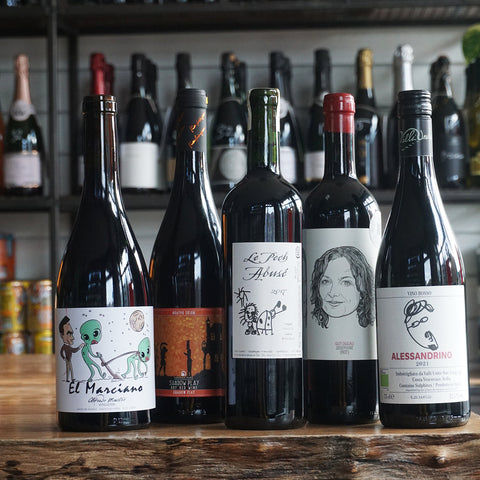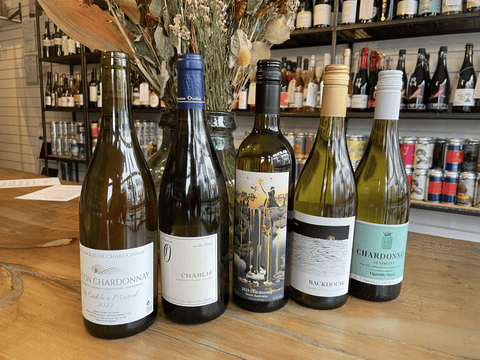Author: Iain Haslam
Think natural wine is limited to light-bodied fruit bombs? Think again… Keep the winter blues and chilly weather at bay with a round up of our favourite comforting reds, all of which come as nature intended – without the addition of any chemical nasties.
Whether you’re new to the natural wine scene or a seasoned expert, there’s sure to be something in this list that takes your fancy, from a rich and smooth Bordeaux-esque blend to a meaty Italian banger, a new wave Austrian superstar, a humble Greek old-timer, or a wild and individual Spaniard.
Classic with a twist - Le Pech Abusé!
2017, Domaine du Pech, Buzet, France
Grape Varieties: Merlot, Cabernet Sauvignon, Cabernet Franc
Red wines consisting of Merlot, Cabernet Franc and Cabernet Sauvignon are internationally famous as the primary constituents of Bordeaux but travel an hour or so Southeast and you’ll come across the tiny appellation of Buzet AOC, where you’ll find a hidden gem for French reds. It is here that Magali Tissot and her partner Ludovic Bonnelle make some of the best low-intervention wines to be found in all of Europe – farming biodynamically and without fertilisers, instead preferring to use medicinal plants and minerals. They only use natural yeasts and bacteria, and the wines are bottled without filtration, producing a highly authentic result.
The Pech Abusé offers expressive aromas of blueberry, blackberry and sloe, mingled with earthy, smoky and mineral notes. On the palate these flavours continue, along with further ripe black fruit flavours, a juicy acidity and ripe, well integrated tannin leading to an elegant and round finish. Decant a few hours beforehand to open up a silkiness and finesse reminiscent of a quality Bordeaux; this wine is a great option for those that love the classics but are bored of the stayed supermarket homogeneity.

The Icon – Josephine
2020, Gut Oggau, Burgenland, Austria
Grape Varieties: Roesler, Blaufränkisch
Next in the spotlight is Gut Oggau: a 14-hectare Austrian wine estate run by Eduard Tscheppe and his wife Stephanie, located by Lake Neusiedl. Right from their first vintage the duo were stunned at how much character shone through from each different wine, and so decided to create a multi-generational family tree, with each wine corresponding to a particular family member. To complete the story, German artist Jung von Matt imagined up faces for each, which are represented on the now-iconic labels.
Josephine belongs to the second generation of the family - treading the line between elegance and playfulness. She is a 50/50 blend of Roesler and Blaufrankisch, vinified in barrel and aged in oak for eight months; the wine carries notes of wild berries, earth, and peppery spice. Eduard and Stephanie describe her as “a free spirit, unable to be contained. Delighting your senses and challenging your sensibilities with every sip you take. Josephine encourages us to open our minds to new ideas and explore new horizons. She inspires us to dare the unknown. That is her gift to the world.” We can’t promise all the above, but you’ll certainly appreciate tasting this gift. Quite simply a must try wine for any self-respecting natural wine lover.
The Budget Banger – Alessandrino
2021, Cooperativa Valli Unite, Piemonte, Italy
Grape Varieties: Barbera, Dolcetto, Croatina
Something of a poster boy for affordable Italian natural wine, Alessandrino pulls no punches and unapologetically displays bags of rich, savoury flavour. On the nose there are heady aromas of farm animal with sweet spices and juicy red fruits. This is backed up on the palate by a meaty, gamey hit; a vibrant acidity; and mouth-filling juiciness. A no-brainer this winter – perfect for pairing with Ragù or earthy mushroom dishes
As the name suggests, Valli Unite is a cooperative founded by three local farmers that all shared a common conviction in organic agriculture and a reduction in reliance on chemical interventions in the winemaking process. Three decades on, and they are still going strong, producing wines that display a clear sense of time and place, without the price tag normally associated with such quality.
The Alessandrino reads like a natural wine checklist: starting with the farming, which is done organically and in accordance with biodynamic principles. The grapes are harvested by hand and allowed to spontaneously ferment using native yeasts, with the use of concrete vats in order to add roundness and softness to the wine. Finally, the finished product is bottled unfiltered, unfined and without the addition of sulphur.

The Nod to Antiquity – Shadow Play
2019, Kamara, Thessaloniki, Greece
Grape Varieties: Xinomavro
Alexander is not the only Great thing to come out of the hills surrounding what is now Thessaloniki – grapes have been grown in the ancient region of Macedonia for thousands of years, as evidenced by ancient grape pips discovered in eastern Macedonia. Coins and ceramics from the 5th Century BC denote wine production in the classical period, and Macedonian amphorae have been found across Europe, suggesting that the wines were exported around the Mediterranean. After a brief lull caused by phylloxera and the World Wars, this region now produces some of Greece’s most sought-after reds.
Dimitrios Kioutsoukis’s family migrated from a famed wine region bordering the Black Sea over 100 years ago, but it would take a century before the dream of opening a vineyard of their own materialised for the family. Dimitrios’ philosophy is one that agronomy should harmonise with nature, rather than fight it. As he sees it, the majority of farmers have thought of nature as flawed, as something that really needed intervention, leading to the use and abuse of fertilisers, pesticides, fungicides and the subsequent destruction and weakening of the natural world. In contrast, Dimitrios’ vineyards are exclusively treated with long-standing traditional methods, including manual pruning-hoeing-harvesting, use of herb sprays, natural fertilization with compost and manure and newly planted vines shaped in basket crowns. The basic rule is doing as few treatments as possible, trying not to subvert the natural equilibrium.
The Shadow Play is named after traditional Greek shadow theatre, and we see a scene on the label depicting the character Karagiozis – a character that was portrayed as combatting the rich conquerors who were responsible for the deterioration of the conquered country. Like Karagiozis, Dimitrios notes that his wines “fight” against the conventional wines which are part of the biggest problem of our world, the deterioration of nature. Absolutely nothing is added to the grapes during the winemaking process, and the juice is aged for 12 months in old barrels and stirred on fine lees for 3 months in order to add greater complexity and a rich mouthfeel. The resultant wine is a full-bodied comfort blanket, carrying aromas of berries, tomato and black olive, with well-integrated tannins and a long-lasting aftertaste on the palate. This would be a great option for anyone who is into Northern Italian reds such as Barolo, or even a Northern Rhone Syrah like Hermitage.
Wild and Wonderful – El Marciano
2021, Alfredo Maestro, Ribera del Duero, Spain
Grape Varieties: Garnacha
To finish up, we have a playful Spanish option from Alfredo Maestro, a bright light in the Ribera del Duero region amongst an abyss of industrially farmed, over-ripe, over-oaked, and over-manipulated commercial plonk. Having started winemaking in 1998, in the early 2000s Alfredo had something of a revelation and began questioning why he was adding exogenous yeasts, acid, enzymes, tannins, colour-enhancers etc. to his wines to create something that merely repeated what everyone else in the region was manufacturing. Instead, he decided that he wanted to work as naturally in the winery as he did in the vineyard, in his words - "to better tell the story of the land." Since 2003, Alfredo produces 100% natural wines, with absolutely no sulphur added in the vineyard or the winery, and the wines are bottled without fining or filtration. All vineyard treatments are natural, and many of them follow biodynamic practices.
El Marciano is Alfredo's main Garnacha bottling, made from 50-90 year-old vines grown on decomposed granite soils at a staggering 1,000-1,200 meters elevation in the Sierra de Gredos mountain range around the village of Navaredondilla. (The area is known for UFO sightings, thus the wine's name and label.) Hand harvested grapes are part crushed with a remaining 30% left in whole bunches. They are fermented with wild yeasts and raised in steel vat, followed by 4 months aging in French oak to lend some structure to the party.
El Marciano is another rustic and rich wine, with notes of cherry, plum, liquorice and leather on the nose. This is complemented on the palate with lots of juicy fruit and a medium body, alongside an acidity that keeps the wine light on its feet and complex in nature. A wine that doesn’t take itself too seriously: drink this with charcuterie or tapas and pretend you’re on a hillside Bodega in Spain.

Check out all our natural wine >>


